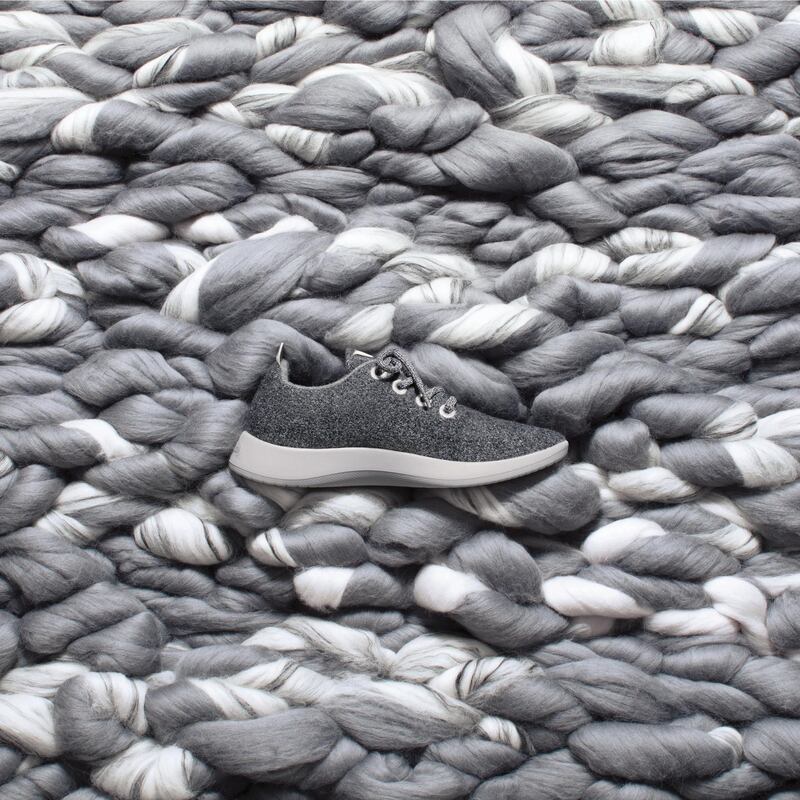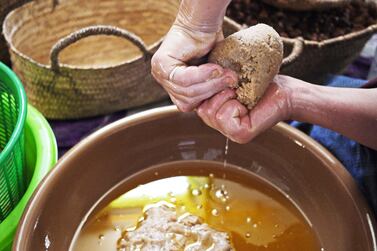Planet-conscious shoe addicts can now breathe a sigh of relief. Yes, the footwear industry emits 700 million tonnes of carbon dioxide each year. It also produces about 20 billion pairs of shoes annually, 90 per cent of which end up in landfill. But the good news is that, because of these shocking statistics, some lateral-thinking brands are putting their best foot forward to design, produce and deliver shoes we actually want to wear while causing as little damage to the Earth as possible.
Studies show that the next generation of consumers is increasingly sustainably minded. In 2017, marketing agency Cone Communications found that 94 per cent of Gen Z-ers believe companies should address environmental and social issues compared to 87 per cent millennials. The trickle-down effect is working, and the proof is in the footwear. Even a multi-brand platform such as luxury retailer Net-a-Porter is launching an eco-edit next month, packed with fashion tha tputs the planet first. As for conscientious start-ups you can support, here are some footwear labels that are pioneering guilt-free kicks created from the unlikeliest of materials.
Merino wool and sugarcane at AllBirds
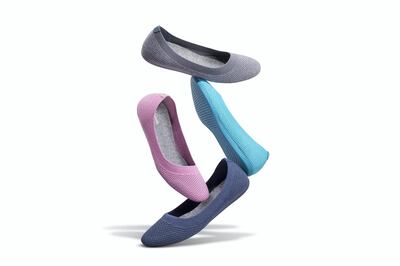
New Zealand natives Tim Brown and Joey Zwillinger founded the AllBirds brand with the aim of developing stylish shoes that are completely carbon-neutral. One for the minimalists – with fans such as Mila Kunis and Leonardo DiCaprio – the men's and women's lines of trainers and flats at this label are pared-back, free of flashy branding and made for comfort.
Ultra-soft merino wool, a material that New Zealand is abundant in, is what makes up most of the AllBirds footwear collection. Using fibres that are 20 per cent the diameter of human hair, this super-fine merino is breathable, temperature-regulating, moisture-wicking and free from that irritating woolly scratchiness.
The brand also uses Tencel, a tree fibre sourced from South African farms that rely on rainfall, not irrigation. Compared to traditional materials such as cotton, Tencel uses 95 per cent less water and cuts the brand's carbon footprint in half.
AllBirds laces are made from recycled plastic bottles, while sugarcane sourced from southern Brazil is transformed into that comfy SweetFoam shoe sole.
This is not a shoe you'll want to get rid of after six months of use. Brown and Zwillinger are designing footwear that's in it for the long haul and they're so convinced of their product's comfort levels, they promise anyone who's not happy with their shoes a refund after 30 days of wear.
Wild rubber and recycled cotton at Veja
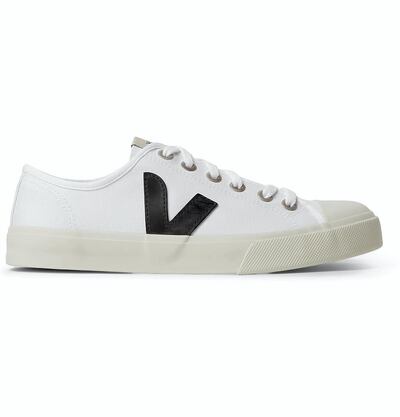
Sustainable fashion fans will be aware of Veja, probably the biggest success story in eco footwear. Launched in 2005, the brand prides itself on "standing up with one foot in design and the other in social responsibility". It creates footwear for men, women and children, and has a vegan line – all made in support of Amazon reforestation and giving back to the local producers that make up the first link in the slow-fashion chain.
Veja shoes are made from rubber bought directly from local seringueiro communities, whose job it has been for generations to grow and harvest wild rubber in the Amazon. Sourcing this wild rubber means the brand has been able to protect about 120,000 hectares of the Amazon from deforestation, supporting indigenes to hold on to their locale and their livelihood. The shoes' canvas is made from recycled bottles and cotton collected from the considerable waste produced by the fashion industry. As an aside, in its bid to offer complete transparency, the brand makes its worker contracts available to read on the website.
Sleek shoes with a signature V stamp (Veja is Brazilian for "look", signalling the process of looking beyond the shoe to how and where it is made), from smart white lace-ups to primary-colour-hued strap-fastening trainers, make up the Veja collection. Net-a-Porter has sold more than 15,000 pairs since the label launched on its site last year, not least because of Veja's wide celebrity following, with everyone from Meghan Markle and Emma Watson to Eddie Redmayne and Emily Ratajkowski sporting a pair.
Recycled plastic bottles at Rothy’s
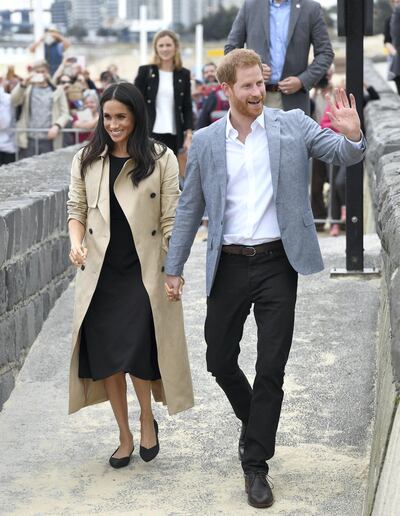
After stepping out in a pair of Veja trainers last year, Meghan Markle put Rothy's on the map. She swapped the expected stiletto for a well-chosen pair of flats from this San Francisco start-up on her Australia tour last October, demonstrating that she is clearly thinking carefully about her fashion choices and how they might be affecting our ecosystem.
Made from recycled plastic bottles, Rothy's offers a kaleidoscopic edit of neat flats in almost every colour imaginable. From pointy-toe slippers in primary tones to leopardprint ballet pumps and camo slip-ons, every shoe at Rothy's takes another unnecessary plastic bottle out of our world and gives it another life, on your foot.
Turning recycled, single-use plastics into something both beautiful and useful, the brand – founded in 2016 – has taken 20 million plastic bottles destined for landfills or the ocean and repurposed them into timeless, durable flats. All of its shoes are 100 per cent recyclable, right down to the non-toxic biodegradable adhesives used to conjoin the sole and upper.
Appleskin at Womsh
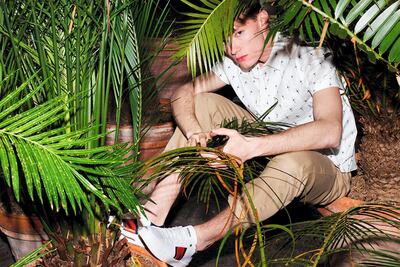
Italian retailer Womsh delivers chunky street footwear with an urban aesthetic. Perhaps best described as the more outgoing younger sister of Allbirds and Veja, Womsh shoes scream their eco credentials loudly and proudly – and its footwear comes stamped with the brand's signature W in a contrast colour, also with patterned laces and distinct details in popping hues.
Launched in 2014, the brand uses sustainable materials for its footwear, which is designed, produced and packaged in Italy. Its vegan line, for instance, is made from the waste produced by the apple processing industry. The fruit fibre is combined with polyurethane to produce appleskin (the company that created it, Frumat Leather, won the Technology and Innovation Award at Green Carpet Fashion last year).
The company also takes part in the Impatto Zero project, through which it compensates for any residual carbon dioxide released by creating and protecting new-growth forests; so far Womsh has preserved 12,000 square metres of equatorial forest in Italy and Madagascar. Additionally, if you wear your shoes out, you can return them to Womsh to be reused and recycled into anti-shock flooring for children's playgrounds.
Recycled rubber and castor oil at Good News
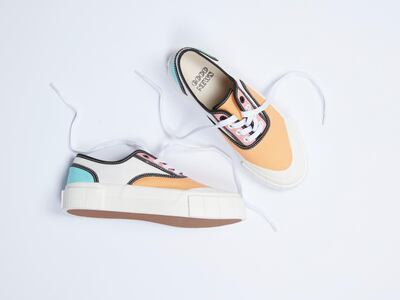
Fans of the skater aesthetic and bold colourblocking will love this London label. Irreverent style is injected across its collection, with contrast colour seams, chunky soles and panel inserts with juxtaposing textures adding the fun notes of detail that typify this brand.
“When you’re small, you gotta fix what you can” goes the motto at Good News, which takes saving the planet seriously, without being too haughty about its mission.
Both the "eco" sock and hefty sole of a Good News shoe are made of non-toxic, recycled rubber from old car tyres. The uppers are made with organic cotton grown without pesticides and other toxins, while the insoles use recycled EVA normally found in mattresses. The soles are produced using castor oil (rather than petroleum), while its recycled cardboard boxes have the returns policy printed on them rather than on an extra piece of paper.
Like AllBirds, the brand aims for carbon neutrality and each pair of trainers is made to outlast a standard pair. Once you're done with your Good News shoes, know that they're made to be recyclable so as not to end up on a landfill, while any dead stock goes to homeless shelters and charities.
Hemp and leather produced from plastic at Susi Studio

Proving that the eco-footwear offering isn't limited to trainers, brands such as Los Angeles start-up Susi Studio are now designing heels rooted in a cruelty-free philosophy for women who take the planet as seriously as they do their fashion.
The 100 per cent vegan products are free from any material derived from animals. Its pretty heeled slingbacks, 1960s-inspired faux suede camel boots, summery gingham platforms and super-sheen patent ribbon lace-ups are all made using sustainable materials, including canvas, denim, hemp and faux leather produced from recycled plastic bottles.
Rooted in aligning the modern woman's values with what she wears, this brand is one you can look to for a shoe that's perfect for your next big night out without compromising on your ethics. Much like Emma Watson did for the MTV Awards.
